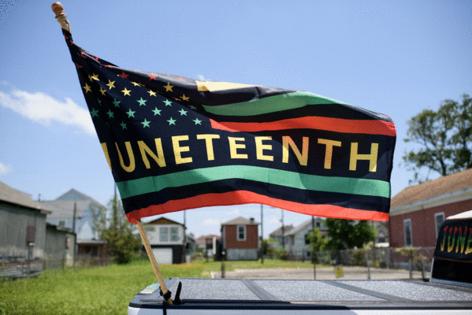LZ Granderson: Overcoming America's past is everyone's responsibility
Published in Op Eds
It's been nearly 10 years since my cousin Ingrid Scott-Weekley passed away from cancer. She was a remarkable woman who taught me a lot about race in America. One of her most important lessons? Overcoming America's past is everyone's responsibility.
Recognizing Juneteenth is a small yet important part of that overcoming.
The fact it wasn't a federal holiday until 2021 is a reflection of both racism and our uneasiness talking about race, not an indication of the importance of the day itself. Case in point: Former president Donald Trump and current Second Gentleman Doug Emhoff couldn't be further apart politically yet neither knew about Juneteenth until recently.
That was not an accident.
So teaching people about our collective past has to be just as intentional. And my cousin was committed to that intentionality.
Born in Mississippi during the 1950s, Ingrid and her family moved to Southern California to break free from the grip of Jim Crow while she was growing up. After graduating from Santa Ana High School, Ingrid went on to earn a law degree from UC Law San Francisco. In 1989 she became the equal opportunity director for Grand Rapids, Mich. That's where we met.
At that time, she was trying to get the city's big new project named after Rosa Parks, but the initiative was facing resistance.
The issue wasn't the name as much as the location.
The city had hired Maya Lin, who designed the Vietnam Veterans Memorial in Washington, to oversee the $6 million park in the heart of downtown. City leaders envisioned the site to be a statement to the world. And many did not want the civil rights movement to be that statement.
The sentiment from detractors at the time was that downtown was meant for everyone — and so they didn't want Parks' name to remind tourists of legislated bigotry.
The unspoken corollary: Buildings and streets named after Martin Luther King Jr. or Rosa Parks belong in the Black community.
It was as if they thought that the civil rights movement had nothing to do with white people.
Eventually the measure passed 4-3. Instead of the city's crown jewel being named something generic — "Reflections" was one of the suggestions — it's named after a woman who risked her life in the fight for equality.
And that was considered controversial.
Just as the federal holiday for Dr. King was controversial.
As well as Juneteenth.
There had been attempts to make the marking of the end of slavery a holiday since 1996, when Rep. Barbara-Rose Collins introduced legislation. In 2016, the teacher and activist Opal Lee walked from her home in Texas to Washington to bring attention to the day. Still it remained in limbo until the murder of George Floyd in 2020.
Even as that horrific event sparked global protests, Trump planned a campaign rally in Tulsa on the holiday — before outcry forced him to reschedule. Something about a white nationalist holding a political rally at the site of a horrific race riot on the day the enslaved were freed just felt off.
Trump wasn't aware his own White House had released a statement marking the occasion. He told the Wall Street Journal the controversy around his Tulsa rally made Juneteenth "famous" and "it's actually an important event, and important time. But nobody had ever heard of it."
That was 2020.
The following year Trump was suing to have the votes tossed out where a lot of Black people live in a bid to overturn the election that he lost. And President Joe Biden signed the Juneteenth holiday into law. Not in reaction to Trump or to placate the Black community but because it's a day that should matter to all Americans.
That includes white people, something Emhoff told me can't be emphasized enough.
"There is a marked effort to erase history," he said last week. "What I've seen is dark forces trying to divide us. Trying to put a wedge in between people and one of those wedges is diversity, equity and inclusion as if diversity is somehow a bad thing. We have to push back. We cannot let people get exhausted from pushing back."
This year he visited two cities in the South — Raleigh and Birmingham — to mark Juneteenth and to remind voters of the role the Biden administration had in making it a federal holiday.
Polls are still showing Biden may be losing support in the Black community heading into November. The campaign is dedicating significant resources to get the word out on what the current administration has accomplished to earn the support of Black voters — such as the infrastructure bill, student loan forgiveness, historic low unemployment and the confirmation of Ketanji Brown Jackson, the first Black woman on the Supreme Court. Yet in large part because of the Senate, criminal justice reform and voter protection were campaign promises that Biden has not yet been able to accomplish. As a result, there's concern about apathy.
"We can do more than one thing at once," Emhoff said about acknowledging victories while still working toward goals. "It is important to celebrate the history and what it means right now. It's a way to explain to people what's happening now."
"It doesn't matter what color you are, all of this history … it impacts everyone."
_____
©2024 Los Angeles Times. Visit latimes.com. Distributed by Tribune Content Agency, LLC.







Comments